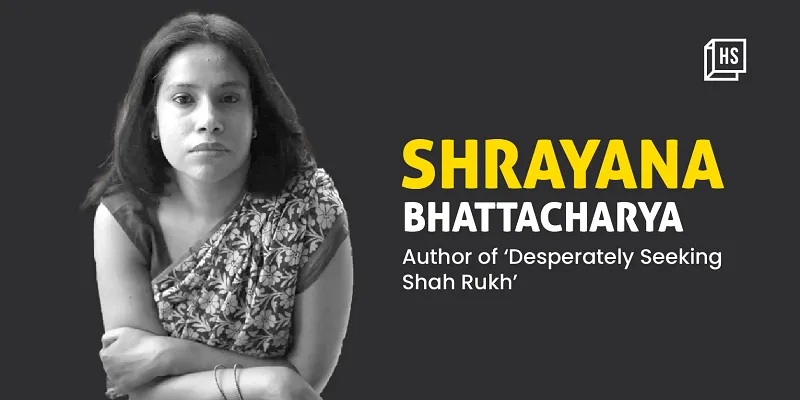‘Desperately Seeking Shah Rukh’: An intimate portrait of the lonely Indian working woman and Daal Subzi feminism
Through statistics, songs, and the Shah Rukh Khan metaphor, Shrayana Bhattacharya brings to life the “seekingness” of Indian women and their private rebellions in a desire-onomics. Navigating between economic agency and emotional hustle, these women are united by their SRK fantasy-fandom.
In Desperately Seeking Shah Rukh: India’s Lonely Young Women and the Search for Intimacy and Independence, the section “Baazigar (gambler)”, an iconic Shah Rukh Khan film title, aptly references the gambles that women in India are playing to take the steering wheel of their lives in their own hands.
A “fanwoman”, “The Accountant” states: “Our lives are spent offering accounts for everything—where we went, what we ate, what we can cook, who we met… everything must be counted and explained. Women make the best accountants—we have answers for everything, we expect to be probed, our lives are audited”.
Vidya, an engineer and a Tamil Brahmin in Delhi, belonging to a “highly privileged minority of Indian women” connects with the self-made aspect of the icon.
For Rampur’s Manju involved in home-based work, Shah Rukh—the “kind, well-spoken man with dimples who lived abroad, paid attention to women and earned good money”—represents a “masculine poetry”.
Lily Soren, a migrant fangirl hailing from Jharkhand’s forested area and a Catholic tribal family employed as a domestic worker in Delhi’s elite Jor Bagh chooses Shah Rukh over Sunday Church sessions. She says: “If only a real man could appreciate his wife and the tiffin she makes for him the way he does in that movie (Rab Ne Bana Di Jodi), girls would have much better lives.”
As Shah Rukh Khan celebrated 30 years in Bollywood last month, it is never untimely to write about his phenomenal female fanbase (across the globe), and how they “desire” the actor, a symbol of modern India. His charm, wit, ability to cry, vulnerable masculinity, the importance that he has given to talking in a romantic relationship, traits or mannerisms which the actor himself describes to be his many “subtleties”.
In Desperately Seeking Shah Rukh, New Delhi-based economist and author Shrayana Bhattacharya delves into the inner monologues of Indian women vis-à-vis the icon of Shah Rukh, the ever-fascinating subject of ‘female gaze’.

“I really wanted the reader to recognise how all these women across class and geographies are united in their ‘seekingness’. Shah Rukh is not a celebrity they are seeking; he’s a metaphor for comfort. All of us were really turning to him (Shah Rukh) because we were so exhausted doing the arithmetic (of life). I think real life is so mathematical, we just want to be really illogical (in our fantasies or private spaces),” Shrayana tells HerStory.
The book brings alive multiple imaginary-yet-intimate relationships that women have forged with the superstar (referred to by his first name), holding his memorabilia close to their heart, which ruthless heteronormative structures do not allow them.
Indian non-fiction and social science writing have routinely dismissed the ‘romantic’ as silly, unintellectual and flippant. Notions rooted in a certain idea of the ‘feminine’ as invested in trifling matters of the heart. But Shrayana writes, “We decide against dismissing her (the female subject’s) heartache as banal.”
By doing so, she also subverts the “disrespectful” trope and terminology of ‘chick lit’. Had this book been about male fandom or classical music aficionados, it would have immediately been accorded a more “serious” status, she adds.
She disapproves of the term “ranting”, referring to its gendered usage. “They always say women rant. We rarely say men are ranting.”
So many of the women she interviewed would tell her that often when they would voice about not feeling acknowledged or unsafe at their workplace, or how men don’t want to date women who focus on their careers, they would be accused of “ranting/talking too much”.
The female fandom space also allows her to give voice to tales of heartbreak, exhaustion, time poverty, lack of privacy and respect, boredom and healing through desiring and seeking for themselves and the icon of Shah Rukh. The tales legitimise those very rants, collectively dismissed by society.
“Rants are important retellings of the structure of barriers that women face to just transform their lives. It’s so hard to watch a film on your own, forget claiming like a flat of your own,” says Shrayana.
Why are women’s intimate revolutions significant?
From having to “seek” permission to go to the cinema hall, watching a film of their choice, fantasising the Shah Rukh that they fangirl on, pursuing a career of their choice, navigating the transactional and loveless nature of marriage, everyday life for a woman in India is the story of strenuous “drudgery”, thankless toil, and exacting emotional “hustle”.
Designed to demand, normalise, and invisibilise women’s domestic labour, the home and the family are the site of this everyday drudgery for women, where elements of sisterhood, female friendship let alone fandom, pleasure, fun, intimacy are deemed as corrupting influences.
“I wrote the book as a response to the traditional way of writing about gender politics, cultural change and the economy, which tends to deify very obvious forms of resistance. Being out on the streets, screaming on Twitter, fighting a case; there are these very obvious tropes of what resistance looks like, and I’m not undermining their importance. But what if someone’s resistance is outside those tropes?,” she asks.
Often, resistance is when a woman chooses to not give in and “settle” down for a conventional marriage, chooses thrills over a boring life, doesn’t give up her job no matter what, chooses to watch her favourite hero espouse love on screen, or fights the curfew against female solidarity over giggles, gossip and Shah Rukh.
Beyond Twitter hashtags, Shrayana terms these intimate revolutions as “daal subzi” feminism.
“These are women performing really tough jobs of social change, which demands repeated interactions and very complex social negotiations with your loved ones. That’s the root of social change,” Shrayana reminds.
It’s not possible to change intergenerational mindsets and biases overnight, or through external diktat or law. “They change through interpersonal intimate interactions… through dialogue and debate with the people we trust, we talk to, in our own intimate milieu,” she dissects “emotional labour”.
These women were trying to change the way their fathers or their loved ones—husbands, boyfriends or potential partners—viewed the work and role of women.
“And I realised that none of this was ever acknowledged or rewarded and that’s why they love Shah Rukh Khan because he is a break from feeling so unacknowledged in this labour.”
Neither heroes nor victims, they’re what Shrayana calls the “missing middle” of the narrative. They are part of a very tiny minority in the country that chooses to hold on to their economic independence.
“They’re in the trenches of social resistance,” she asserts.
Economics and emotional hustle of love
The matrices of interpersonal relationships are etched in traditionally organised structures of gender hierarchies; it’s an exercise in power. For women to hold on and rise up in their professional world is not enough; the toil and double the work continues in the domestic space.
“Women are never allowed to enjoy the perks of their successes either. They are taxed in the mating market. They are taxed by their families,” decodes Shrayana.
The author wanted people to recognise that there is an “economics of seeking love” as well.
The study of ‘love’ is inseparable from the study of the economic origins of how the mating market is structured. When a woman can’t have a house on their own, they are rendered dependent on men. And that then manifests in the way they are approaching the mating market, the author explains.
“The labour market is making you feel lonely; the real estate market is making you feel lonely; the way the job market is structured, it is making you feel lonely,” Shrayana elucidates.
In Asia, India has one of the lowest female employment rates amongst the elite, Shrayana reminds.
Most women in India drop out of the workforce very early on; most women in India are not socialised to think of a job or economic independence that they must aspire for.
Urban women might have a lot more agency when compared to their rural counterparts, yet they are socially conditioned to accept disrespect or a lack in their relationship. “It’s astonishing to see how economic independence may not necessarily translate into an agency in private,” she reminds.
Women are constantly made to feel that they need to hustle; they need to look a certain way; behave in a certain way; be a certain way. This is what Shrayana calls the “hustle culture of love".
Shah Rukh as a site of self-love
“Shah Rukh holds so much appeal for so many of us because it's that one place where we feel that all that mathematical calculation can/has to go. I wrote it because I absolutely love him. I have no expectations of him,” explains Shrayana. A shared sisterhood seeking “ShahRukh-ness” in the taxing world of heteronormative love.
Shrayana cultivates this icon to get to the fact that “there are these deep fissures in our society and women accessing money, love, free space and economic autonomy”.
In the book, Shrayana writes, “He isn’t a feminist icon, but certainly a female on.” Many films of Shah Rukh give more or equal talking time and screen space to women, presenting a picture of equal romantic partnership. In Dilwale Dulhania Le Jayenge (1995), his romantic hero character engages in performing domestic chores and helps an unmarried aunt select a sari, tasks not considered “manly”. In Zero (2018), he ‘dwarfs’ the conventional male hero cult, in favour of his character being “ridiculed” by the leading women characters (Anushka Sharma and Katrina Kaif).
Like pleasure, Shah Rukh is seen as a corrupting influence by patriarchs in the women’s families/lives, setting impossible standards of romantic love and conjugality.
And this is where the icon fits in with his endearing masculinity—as the non-threatening companion, the charming confidante, the trusted lover in the pursuit of pleasure, the sexy partner in the pursuit of intimacy. An alternative; a site of resistance where they are without the domestic taxes of labour, market prices of mating, personal judgement, taunt or disrespect acting as barriers to self-love and care.
Through the patriarchal terrains of Jaisalmer-Jaipur-Delhi, “A Girl Called Gold” dances with abandon to Shah Rukh songs, something that her family reprimands by saying no decent Khatri girl would do that, pursues a jet-setting career in aviation, a first in her family, and plays along the urban dating game. While nursing a heartache, Shah Rukh in Jab Tak Hai Jaan (2012) uplifted Gold and helped her recover her sex drive: “Thoughts of his sexiness lingered through the week. She masturbated, she dreamt crazy wild dreams about the hours he devoted to her neck and shoulders,” Shrayana recounts in the chapter.
“In moments when we are taxed by society… I feel each one of us needs someone; someplace. He’s almost like a shelter, like the architect’s vision, and the book actually called it a ‘holding space’,” she surmises.
Hardly acknowledged in Indian popular imagination, the book celebrates female fandom and fantasies as tales of subversion.
Carved out of innermost desires, unmet needs and tabooed thoughts, fantasies are a temporary release from the oppression of hustling for love and respect, the ignominy of being uncared and unacknowledged.
“...Everybody just wants to feel loved on their own. And all these women like watching Shah Rukh as by doing so they are all taking care of themselves. And their fantasies. That's a very important part of loving, to enjoy yourself and to claim your own needs,” she reminds.
“All the women in the book, when they’re spending that time with Shah Rukh, are almost imagining an alternative future for themselves. Away from traditional marriage, where they can just go out and watch a film anywhere, and be totally safe; where they can date a man like him; where they can exercise sexual and economic autonomy,” says Shrayana. “We’re not interested in being part of this ‘very boring femininity’ that is so deified in our culture,” Shrayana lights up.
When Shrayana writes, “Salman (Khan) protects women, Aamir teaches us and Shah Rukh sees us”, (female) fans will find themselves nodding in agreement!
Despite the inequities, love outside conventional morality and taxing labour symbolises the individual quest for liberation, spiritual, sexual or/and soulful. As Shah Rukh smiles and dances to “pyar kar (fall in love)”.
Edited by Teja Lele









